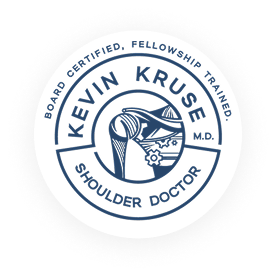Video: Why did my rotator cuff tear?
Why did my rotator cuff tear? I get this question very frequently in my office and really there’s two tiers here. I think when someone falls and they injure their rotator cuff, it’s pretty obvious why they tore it. You know, they have an injury but at least 95% of my patients who have a torn rotator cuff, they had no injury. They just started developing a shoulder that ached and they come in, we look at the shoulder, we ultrasound them or maybe they’ve had an MRI and it shows a tear and they want to know how did this happen, they don’t remember an injury and so the vast majority of rotator cuff tears are chronic. This means the tendon just wears out and tears and people want to know how did this happen and some of the analogies that I give patients are:
- Have you ever seen a person go bald in their twenties?
- Have you ever seen a person in their earlier thirties have grey hair?
- Have you ever seen a fifteen year old kid with glasses?
And so as with all these things, we all age at different levels. And if I were to go take a group of one thousand people that were one hundred years old or ninety years old and ultrasound their shoulders at least 80% of them would have rotator cuff tears. If I were to go pick one thousand ten year old kids and ultrasound their shoulders, none of them would have rotator cuff tears, it’s extremely rare, almost never, so that’s what happens.
Why do certain people get them sooner than others. We think it’s likely to do with genetics, so it’s your age and genetics. So some people get rotator cuff tears in their forties, some in their fifties, some sixties, some never. Some people get small rotator cuff tears and they never see a doctor because it doesn’t hurt. It’s really a combination of your age and more importantly your genetics. That’s what causes most rotator cuff tears.
Why do some people genetically get them? We think it has to do with blood flow and vascularity and some people maintain the blood flow to that tissue a little bit better across their lives.

